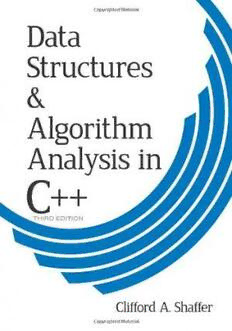Table Of ContentData Structures and Algorithm
Analysis
Edition 3.2 (C++ Version)
Clifford A. Shaffer
DepartmentofComputerScience
VirginiaTech
Blacksburg,VA24061
September15,2011
Update3.2.0.2
Foralistofchanges,see
http://people.cs.vt.edu/˜shaffer/Book/errata.html
Copyright©2009-2011byCliffordA.Shaffer.
ThisdocumentismadefreelyavailableinPDFformforeducationaland
othernon-commercialuse. Youmaymakecopiesofthisfileand
redistributeinelectronicformwithoutcharge. Youmayextractportionsof
thisdocumentprovidedthatthefrontpage,includingthetitle,author,and
thisnoticeareincluded. Anycommercialuseofthisdocumentrequiresthe
writtenconsentoftheauthor. Theauthorcanbereachedat
shaffer@cs.vt.edu.
Ifyouwishtohaveaprintedversionofthisdocument,printcopiesare
publishedbyDoverPublications
(seehttp://store.doverpublications.com/048648582x.html).
Furtherinformationaboutthistextisavailableat
http://people.cs.vt.edu/˜shaffer/Book/.
Contents
Preface xiii
I Preliminaries 1
1 DataStructuresandAlgorithms 3
1.1 APhilosophyofDataStructures 4
1.1.1 TheNeedforDataStructures 4
1.1.2 CostsandBenefits 6
1.2 AbstractDataTypesandDataStructures 8
1.3 DesignPatterns 12
1.3.1 Flyweight 13
1.3.2 Visitor 13
1.3.3 Composite 14
1.3.4 Strategy 15
1.4 Problems,Algorithms,andPrograms 16
1.5 FurtherReading 18
1.6 Exercises 20
2 MathematicalPreliminaries 25
2.1 SetsandRelations 25
2.2 MiscellaneousNotation 29
2.3 Logarithms 31
2.4 SummationsandRecurrences 32
2.5 Recursion 36
2.6 MathematicalProofTechniques 38
iii
iv Contents
2.6.1 DirectProof 39
2.6.2 ProofbyContradiction 39
2.6.3 ProofbyMathematicalInduction 40
2.7 Estimation 46
2.8 FurtherReading 47
2.9 Exercises 48
3 AlgorithmAnalysis 55
3.1 Introduction 55
3.2 Best,Worst,andAverageCases 61
3.3 AFasterComputer,oraFasterAlgorithm? 62
3.4 AsymptoticAnalysis 65
3.4.1 UpperBounds 65
3.4.2 LowerBounds 67
3.4.3 ΘNotation 68
3.4.4 SimplifyingRules 69
3.4.5 ClassifyingFunctions 70
3.5 CalculatingtheRunningTimeforaProgram 71
3.6 AnalyzingProblems 76
3.7 CommonMisunderstandings 77
3.8 MultipleParameters 79
3.9 SpaceBounds 80
3.10 SpeedingUpYourPrograms 82
3.11 EmpiricalAnalysis 85
3.12 FurtherReading 86
3.13 Exercises 86
3.14 Projects 90
II FundamentalDataStructures 93
4 Lists,Stacks,andQueues 95
4.1 Lists 96
4.1.1 Array-BasedListImplementation 100
4.1.2 LinkedLists 103
4.1.3 ComparisonofListImplementations 112
Contents v
4.1.4 ElementImplementations 114
4.1.5 DoublyLinkedLists 115
4.2 Stacks 120
4.2.1 Array-BasedStacks 121
4.2.2 LinkedStacks 124
4.2.3 ComparisonofArray-BasedandLinkedStacks 125
4.2.4 ImplementingRecursion 125
4.3 Queues 129
4.3.1 Array-BasedQueues 129
4.3.2 LinkedQueues 134
4.3.3 ComparisonofArray-BasedandLinkedQueues 134
4.4 Dictionaries 134
4.5 FurtherReading 145
4.6 Exercises 145
4.7 Projects 149
5 BinaryTrees 151
5.1 DefinitionsandProperties 151
5.1.1 TheFullBinaryTreeTheorem 153
5.1.2 ABinaryTreeNodeADT 155
5.2 BinaryTreeTraversals 155
5.3 BinaryTreeNodeImplementations 160
5.3.1 Pointer-BasedNodeImplementations 160
5.3.2 SpaceRequirements 166
5.3.3 ArrayImplementationforCompleteBinaryTrees 168
5.4 BinarySearchTrees 168
5.5 HeapsandPriorityQueues 178
5.6 HuffmanCodingTrees 185
5.6.1 BuildingHuffmanCodingTrees 186
5.6.2 AssigningandUsingHuffmanCodes 192
5.6.3 SearchinHuffmanTrees 195
5.7 FurtherReading 196
5.8 Exercises 196
5.9 Projects 200
6 Non-BinaryTrees 203
vi Contents
6.1 GeneralTreeDefinitionsandTerminology 203
6.1.1 AnADTforGeneralTreeNodes 204
6.1.2 GeneralTreeTraversals 205
6.2 TheParentPointerImplementation 207
6.3 GeneralTreeImplementations 213
6.3.1 ListofChildren 214
6.3.2 TheLeft-Child/Right-SiblingImplementation 215
6.3.3 DynamicNodeImplementations 215
6.3.4 Dynamic“Left-Child/Right-Sibling”Implementation 218
6.4 K-aryTrees 218
6.5 SequentialTreeImplementations 219
6.6 FurtherReading 223
6.7 Exercises 223
6.8 Projects 226
III SortingandSearching 229
7 InternalSorting 231
7.1 SortingTerminologyandNotation 232
7.2 ThreeΘ(n2)SortingAlgorithms 233
7.2.1 InsertionSort 233
7.2.2 BubbleSort 235
7.2.3 SelectionSort 237
7.2.4 TheCostofExchangeSorting 238
7.3 Shellsort 239
7.4 Mergesort 241
7.5 Quicksort 244
7.6 Heapsort 251
7.7 BinsortandRadixSort 252
7.8 AnEmpiricalComparisonofSortingAlgorithms 259
7.9 LowerBoundsforSorting 261
7.10 FurtherReading 265
7.11 Exercises 265
7.12 Projects 269
Contents vii
8 FileProcessingandExternalSorting 273
8.1 PrimaryversusSecondaryStorage 273
8.2 DiskDrives 276
8.2.1 DiskDriveArchitecture 276
8.2.2 DiskAccessCosts 280
8.3 BuffersandBufferPools 282
8.4 TheProgrammer’sViewofFiles 290
8.5 ExternalSorting 291
8.5.1 SimpleApproachestoExternalSorting 294
8.5.2 ReplacementSelection 296
8.5.3 MultiwayMerging 300
8.6 FurtherReading 303
8.7 Exercises 304
8.8 Projects 307
9 Searching 311
9.1 SearchingUnsortedandSortedArrays 312
9.2 Self-OrganizingLists 317
9.3 BitVectorsforRepresentingSets 323
9.4 Hashing 324
9.4.1 HashFunctions 325
9.4.2 OpenHashing 330
9.4.3 ClosedHashing 331
9.4.4 AnalysisofClosedHashing 339
9.4.5 Deletion 344
9.5 FurtherReading 345
9.6 Exercises 345
9.7 Projects 348
10 Indexing 351
10.1 LinearIndexing 353
10.2 ISAM 356
10.3 Tree-basedIndexing 358
10.4 2-3Trees 360
10.5 B-Trees 364
10.5.1 B+-Trees 368
viii Contents
10.5.2 B-TreeAnalysis 374
10.6 FurtherReading 375
10.7 Exercises 375
10.8 Projects 377
IV AdvancedDataStructures 379
11 Graphs 381
11.1 TerminologyandRepresentations 382
11.2 GraphImplementations 386
11.3 GraphTraversals 390
11.3.1 Depth-FirstSearch 393
11.3.2 Breadth-FirstSearch 394
11.3.3 TopologicalSort 394
11.4 Shortest-PathsProblems 399
11.4.1 Single-SourceShortestPaths 400
11.5 Minimum-CostSpanningTrees 402
11.5.1 Prim’sAlgorithm 404
11.5.2 Kruskal’sAlgorithm 407
11.6 FurtherReading 409
11.7 Exercises 409
11.8 Projects 411
12 ListsandArraysRevisited 413
12.1 Multilists 413
12.2 MatrixRepresentations 416
12.3 MemoryManagement 420
12.3.1 DynamicStorageAllocation 422
12.3.2 FailurePoliciesandGarbageCollection 429
12.4 FurtherReading 433
12.5 Exercises 434
12.6 Projects 435
13 AdvancedTreeStructures 437
13.1 Tries 437
Contents ix
13.2 BalancedTrees 442
13.2.1 TheAVLTree 443
13.2.2 TheSplayTree 445
13.3 SpatialDataStructures 448
13.3.1 TheK-DTree 450
13.3.2 ThePRquadtree 455
13.3.3 OtherPointDataStructures 459
13.3.4 OtherSpatialDataStructures 461
13.4 FurtherReading 461
13.5 Exercises 462
13.6 Projects 463
V TheoryofAlgorithms 467
14 AnalysisTechniques 469
14.1 SummationTechniques 470
14.2 RecurrenceRelations 475
14.2.1 EstimatingUpperandLowerBounds 475
14.2.2 ExpandingRecurrences 478
14.2.3 DivideandConquerRecurrences 480
14.2.4 Average-CaseAnalysisofQuicksort 482
14.3 AmortizedAnalysis 484
14.4 FurtherReading 487
14.5 Exercises 487
14.6 Projects 491
15 LowerBounds 493
15.1 IntroductiontoLowerBoundsProofs 494
15.2 LowerBoundsonSearchingLists 496
15.2.1 SearchinginUnsortedLists 496
15.2.2 SearchinginSortedLists 498
15.3 FindingtheMaximumValue 499
15.4 AdversarialLowerBoundsProofs 501
15.5 StateSpaceLowerBoundsProofs 504
15.6 FindingtheithBestElement 507
x Contents
15.7 OptimalSorting 509
15.8 FurtherReading 512
15.9 Exercises 512
15.10Projects 515
16 PatternsofAlgorithms 517
16.1 DynamicProgramming 517
16.1.1 TheKnapsackProblem 519
16.1.2 All-PairsShortestPaths 521
16.2 RandomizedAlgorithms 523
16.2.1 Randomizedalgorithmsforfindinglargevalues 523
16.2.2 SkipLists 524
16.3 NumericalAlgorithms 530
16.3.1 Exponentiation 531
16.3.2 LargestCommonFactor 531
16.3.3 MatrixMultiplication 532
16.3.4 RandomNumbers 534
16.3.5 TheFastFourierTransform 535
16.4 FurtherReading 540
16.5 Exercises 540
16.6 Projects 541
17 LimitstoComputation 543
17.1 Reductions 544
17.2 HardProblems 549
17.2.1 TheTheoryofNP-Completeness 551
17.2.2 NP-CompletenessProofs 555
17.2.3 CopingwithNP-CompleteProblems 560
17.3 ImpossibleProblems 563
17.3.1 Uncountability 564
17.3.2 TheHaltingProblemIsUnsolvable 567
17.4 FurtherReading 569
17.5 Exercises 570
17.6 Projects 572
Contents xi
VI APPENDIX 575
A UtilityFunctions 577
Bibliography 579
Index 585

